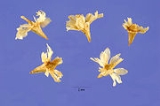
Hymenoclea monogyra
Encyclopedia
Hymenoclea monogyra is a species of flowering plant in the daisy family
known by the common name singlewhorl burrobrush. It is native to the southwestern United States and northern Mexico, where it grows in deserts and adjacent mountains and dry valleys. This is a thickly branching shrub
reaching heights from one to four meters. The thin stems are covered in narrow, hairy leaves and flower in large inflorescence
s of staminate
and pistillate
flowers. The staminate flowers have translucent white corollas and the pistillate flowers are rounded, fruit-bearing structures. The fruit is an achene
with a single whorl of several papery wings.
Asteraceae
The Asteraceae or Compositae , is an exceedingly large and widespread family of vascular plants. The group has more than 22,750 currently accepted species, spread across 1620 genera and 12 subfamilies...
known by the common name singlewhorl burrobrush. It is native to the southwestern United States and northern Mexico, where it grows in deserts and adjacent mountains and dry valleys. This is a thickly branching shrub
Shrub
A shrub or bush is distinguished from a tree by its multiple stems and shorter height, usually under 5–6 m tall. A large number of plants may become either shrubs or trees, depending on the growing conditions they experience...
reaching heights from one to four meters. The thin stems are covered in narrow, hairy leaves and flower in large inflorescence
Inflorescence
An inflorescence is a group or cluster of flowers arranged on a stem that is composed of a main branch or a complicated arrangement of branches. Strictly, it is the part of the shoot of seed plants where flowers are formed and which is accordingly modified...
s of staminate
Stamen
The stamen is the pollen producing reproductive organ of a flower...
and pistillate
Gynoecium
Gynoecium is most commonly used as a collective term for all carpels in a flower. A carpel is the ovule and seed producing reproductive organ in flowering plants. Carpels are derived from ovule-bearing leaves which evolved to form a closed structure containing the ovules...
flowers. The staminate flowers have translucent white corollas and the pistillate flowers are rounded, fruit-bearing structures. The fruit is an achene
Achene
An achene is a type of simple dry fruit produced by many species of flowering plants. Achenes are monocarpellate and indehiscent...
with a single whorl of several papery wings.

